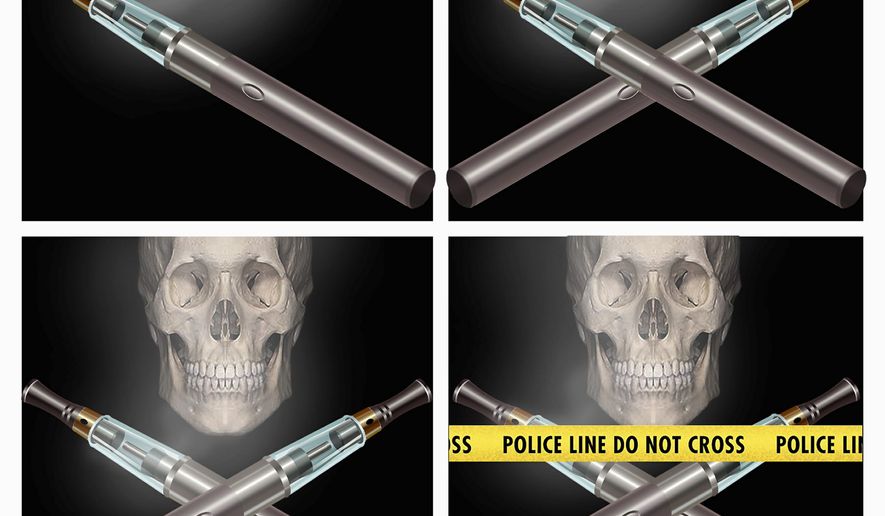OPINION:
Earlier this month, a disturbing incident of over-policing on the boardwalk of Ocean City, Maryland was caught on video. Police tasered a Black teenager and arrested at least two others for vaping in violation of a city public smoking ban. Regardless of what one thinks of the law’s merit, the cops’ draconian enforcement points to a larger problem with modern policing: Minor offenses too often escalate into dangerous, and even deadly, incidents.
Sadly, the D.C. City Council is opening the door for such ruthless tactics in our very city with a proposed ban on all flavored tobacco products, including vapes and menthol cigarettes. The bill, which is set for a second reading on June 29, will reduce the city’s tax revenues and will lead to smokers having further interactions with police — with potentially long-term consequences for minority communities.
First, on the fiscal side, the District’s Office of the Chief Financial Officer estimates that the ban will result in a $3 million loss, or 13.5 percent of cigarette tax revenue over the first year, and an additional decline of $8.6 million over the subsequent three years. However, as the nonpartisan Tax Foundation points out, these numbers are wildly optimistic given the paths of other states like Massachusetts who have a similar ban in place.
The Bay State has seen a drop of $120 million or 26 percent in cigarette tax revenues since their ban took effect in June 2020. DC should conservatively expect a similar drop since, just as in Massachusetts, smokers can easily cross state lines to buy their products of choice. In fact, the D.C. ban could potentially lead to a more severe drop considering that the menthol market share in the district (60%) is twice that of Massachusetts (30%). In total, the Tax Foundation estimates that the revenue drop could amount to $12 million in the first year alone.
As I pointed out in these pages just last month, 85% of Black smokers consume menthol cigarettes compared to just 30% of white smokers. As a result, D.C.’s flavor ban will disproportionately impact minorities in our city. In fact, D.C.’s Council Office of Racial Equality (CORE) raised concerns in its impact assessment, noting that “enforcement of the bill has the potential to exacerbate racial inequity in economic and social justice outcomes.”
As the bill currently stands, the proposed fine for individuals will be no more than $25. However, CORE points out the potential for long-term effects on low-income communities is still severe: “Unpaid fines can increase in size due to late fees, becoming larger than intended by the law but resulting in ‘long-term effects on credit scores and background checks, making it more difficult to secure quality employment or housing, and increasing the likelihood that future financial shocks will be met with other types of unsecured debt, such as payday lenders or credit cards.’”
Moreover, under the city’s Clean Hands Law, residents with outstanding debt to the city over $100 will soon be unable to obtain a driver’s license, business license, or compete for government contracts. This could especially be devastating for small business owners, who face a fine of up to $10,000 per violation of the flavor ban.
Most concerningly, however, is that the law will lead to vapers and smokers of menthol cigarettes having more interactions with police. Considering the demographics discussed earlier, this could have dangerous consequences along the lines of what we see in Ocean City earlier this month. There is absolutely no excuse for D.C. politicians, who have been quite vocal about racial justice over the past year, to turn around and pass a law that will disproportionately impact communities of color for the worse.
To add insult to injury, the council is not holding any public hearings on the bill in a serious blow to government transparency. The council claims it does not need to since it held a public hearing on a full flavor ban in 2020. However, we’ve held an election since then, and the council is in a new session. Residents of D.C. should have the right to petition their government in a timely manner; new laws should not be snuck in through the back door.
The D.C. council’s proposed flavor ban will take a critical hit on the city’s tax revenues and lead to smokers having further interactions with police with long-term consequences on communities of color. At a time when the country is having a much needed conversation about over-policing, D.C. should not surreptitiously force through a bill that its own racial equality office has flagged as having negative consequences for minorities. At the very least, a public hearing needs to be held. My fellow residents of the District deserve better.
• Casey Given is the president and executive director of Young Voices.




Please read our comment policy before commenting.